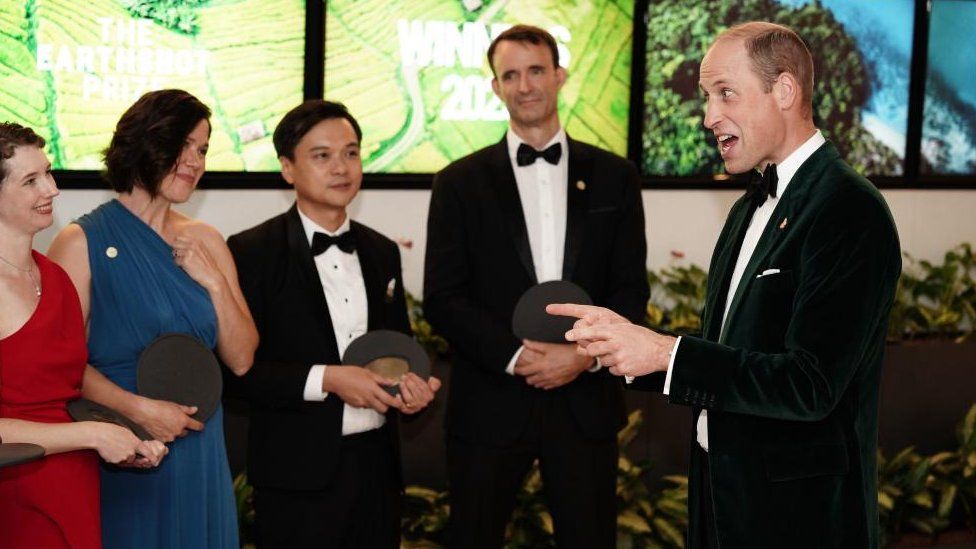7 minutes ago
About sharing
The climate crisis has “become too visible to be ignored”, the Prince of Wales said as he revealed the five winners of his annual Earthshot Prize.
Prince William said he believed this was the decade for collective action to protect the planet.
He announced the winners of the £1m ($1.2m) prize at a ceremony on Tuesday.
They include a company making batteries for electric vehicles using components easier to recycle, and a scheme helping famers to cut food waste.
In a speech at the awards ceremony in Singapore, Prince William said: “The last year has been one of great change and even greater challenge.
“A year in which the effects of the climate crisis have become too visible to be ignored.
“And a year that has left so many feeling defeated, their hope, dwindling.
“However, as we have seen tonight, hope does remain.”
The awards ceremony was hosted by actress Hannah Waddingham, with Sir David Attenborough, Hollywood star Cate Blanchett and former New Zealand Prime Minister Jacinda Ardern among attendees, with performances from OneRepublic and Bastille.
The Princess of Wales said she was sorry not to be there, having stayed behind in the UK to help her son George, 10, through his “first set of major exams”.
The prince continued his speech with an upbeat note, saying “we hold onto the most powerful motivators of all – optimism, and hope”.
He added: “I choose to believe that future generations will look back on this decade as the point at which we globally took collective action for our planet.
“The moment we refused to accept the voices of denial and defeatism, and instead, became the architects of change towards a healthy and sustainable world.”
The annual awards, in their third year and taking place for the first time in Asia, were created by Prince William to fund projects that aim to save the planet.
The prize’s name refers to the “Moonshot” ambition of 1960s America by then-President John F Kennedy, who pledged to get a man on the Moon within a decade.
Who are the winners?
Protect and Restore Nature:
Acción Andina, The Andes Mountains, South America: This grassroots initiative is centred around a commitment to work together for the common good. It unites tens of thousands of people from local and indigenous communities to protect native forests and ecosystems, Earthshot says.
Clean our Air:
GRST, Hong Kong, China: With the market for electric vehicles booming, GRST has developed a cleaner, safer and cheaper way to make and recycle lithium-ion batteries. This involves building the battery using a water-soluble binding composite, enabling its metals to be more economically recovered and reused, and reducing demand for further extraction. The method reduces greenhouse gas emissions from production by 40% and results in a battery lasting up to 10% longer than average, according to Earthshot.
Revive our Oceans:
WildAid Marine Program, Global: This non-profit’s programme helps bolster the effectiveness of Marine Protected Areas – where human activity is strictly regulated. Earthshot says it ensures people have the tools to deter illegal fishing, allow wildlife to recover and improve coastal livelihoods.
Build a Waste-free World:
S4S Technologies, India: Founded in 2013 by six university friends, the organisation helps rural communities combat food waste, poverty, and gender inequality. Its solar-powered dryers and equipment help small-hold farmers preserve crops, and turn produce that might otherwise go to waste into valuable products, Earthshot says.
Fix our Climate:
Boomitra, Global: Boomitra, which means “friend of the earth” in Sanskrit, is a soil carbon marketplace that rewards farmers for sustainable practices. It uses satellites and AI technology to monitor improvements farmers make to the soil, tracking its ability to store carbon over time, according to Earthshot.
Each winner will receive £1m ($1.2m) to develop their innovation. The 15 finalists were whittled down from more than 1,300 nominees.
The awards have been made with recycled materials, including brass sourced from water pipe fittings, household waste and minute metal elements filtered from wastewater sludge, and then amalgamated together.
Guests were asked to wear “pre-loved”‘clothes.
The ceremony is due to be broadcast at 17:20 GMT on Sunday on the BBC in the UK.
Related Topics
5 hours ago
3 December 2022
1 day ago
